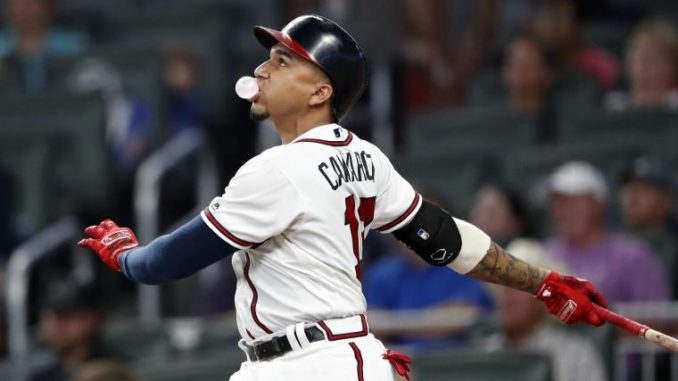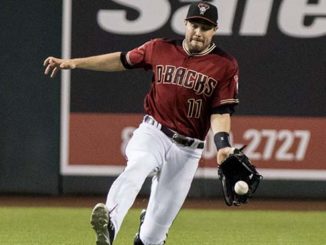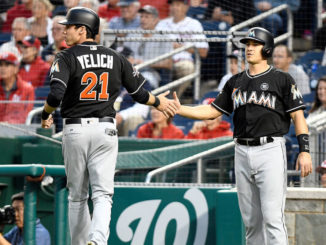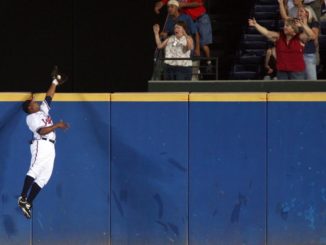
Obviously with the year [Johan Camargo] had, we have no reason to believe he can’t be the every-day guy going forward next year at third base. That doesn’t mean that we’ll rule out something if something presents itself.
– Braves GM Alex Anthopoulos, October 25, 2018
On Monday, the Atlanta Braves announced that an opportunity had presented itself at third base. Josh Donaldson was signed to a one-year contract for an eye-popping $23 million. Brent Blackwell has already broken down the deal, and there’s no need to rehash it. Instead, I want to talk about the guy Donaldson is pushing off third base and what that means for the team.
Johan Camargo was very good for the Atlanta Braves in 2018. After starting the season hurt, Camargo returned and seized the starting third base job from Ryan Flaherty and Jose Bautista. Camargo hit .272/.349/.457, slugged 19 homers, had a 115 wRC+, and was a positive both at the plate and in the field, generating 3.3 fWAR which was good for 11th among qualified third basemen.
This kind of production was never expected from Camargo as he was coming up through the system, even from the Braves. Even after Camargo was installed as the everyday third baseman upon Bautista’s release in May, Anthopoulos talked about the value Camargo provided by being able to play multiple positions.
It is now that added value the Braves will look to tap into with the signing of Donaldson.
Utility vs. SUPER-Utility
Terms like “utility player” and “super-utility” get thrown around, but what do they mean? Utility players have been around since shortly after the game’s inception: a player who is good enough at multiple positions to allow managers flexibility in substituting or giving starters rest. But the concept of a “super-utility” player has only been around for around a decade, and it’s easy to overlook the nuance between the two concepts.
This may be true especially for Braves fans since the Braves have never truly had a super-utility player before. We’ve had players that possibly could have been… guys like Martin Prado, who in his prime was capable of holding down the fort at all four infield positions and both outfield corners. But in practice, the Braves went into each season with Prado penciled in as a starter somewhere, and only moved him off that position during the season late in games during double switches or if there was an injury and Prado was the best defensive alternative.
The Braves have had their fair share of utility players too. They are solid major leaguers, maybe not starting caliber, but subbed in as needed. Jace Peterson, Kelly Johnson (the second and third times), Pedro Ciriaco, Ramiro Pena, and Brooks Conrad are examples of this type of player from Braves teams of this decade. The best of this class was Omar Infante, who went to the All-Star game as a utility player in 2010. It’s tempting to call Infante and Charlie Culberson, who was superb in the role for Atlanta in 2018, super-utility players, but they aren’t quite there. The “plan” wasn’t to have them play as much as they did, but when called upon because of injuries or poor performance of the starters they stepped up.
What makes a player a super-utility player is that he is considered for all intents and purposes, a starter. The planning going into the season is the give the super-utility player regular plate appearances, not just as a fill-in or pinch hitter, but as someone who will intentionally start games but at multiple positions. The prototype of this sort of usage was the Tampa Bay Ray’s Ben Zobrist.
From 2009-18, Zobrist averaged 146 games per season. This is fairly typical of a starting-caliber major leaguer, which Zobrist certainly has been. Zobrist is a three-time All-Star, has merited MVP consideration three times (and in my opinion should have won it in 2009), and signed a four-year, $56 million free agent contract with the Cubs before the 2016 season. Even so, Zobrist has only appeared in over 100 games at a single position in a season four times in those ten years.
Since Zobrist, other players have become super-utility players. Notably, the team that bounced Atlanta out of the playoffs in October, the Los Angeles Dodgers, employ two super-utility players, Enrique Hernandez and Chris Taylor. Last year’s World Series champs, the Houston Astros had Marwin Gonzalez to fill the role, and the Cubs, of course, had the original, Zobrist himself. So why do teams go into a season planning to employ a super-utility when it means sitting a player who should be an everyday starter on the bench? The answer is that the enemy of every baseball team over the course of the season isn’t the other teams. It’s The Grind.
Beating The Grind
It’s not news that a baseball season is a grind. Talk to a baseball player for more than five minutes and they’ll mention this fact. Or you can look at the production of the 2018 Atlanta Braves. Nearly every player had their production fall in the second half due to the tight pennant race and the fact that the Braves reserves were thin.
Braves Offensive Production By Month
| Month | wRC+ | wOBA |
|---|---|---|
| March/April | 107 | .335 |
| May | 100 | .322 |
| June | 95 | .316 |
| July | 95 | .316 |
| August | 97 | .318 |
| September | 88 | .305 |
(By the way, that uptick in team production in August? That was Ronald Acuña winning Rookie of the Year.)
The Donaldson signing helps the team in three ways. First, Donaldson himself is a tremendous offensive force when healthy. Second, it puts a starting-caliber player on the bench every night in the form of either Camargo or whomever Camargo is substituting for that night, increasing tactical options for the manager. Thirdly, it helps beat the grind. Anthopoulos wants to beat the grind through planned resting of the regulars. Camargo can start at multiple positions, allowing the regulars planned days off to keep them fresher longer in the system, to help avoid the gradual fall-off of team production over the course of the season.
While I have been a Braves fan for a long time, I grew up a fan of the Baltimore Orioles, and witnessed the incredible feat that was Cal Ripken Jr.‘s consecutive games streak. For over 16 years, the Iron Man punched the clock and took the field on his way to the Hall of Fame. But here’s a open secret about that streak… Ripken probably should have taken a few days off here and there for the good of the team. As much as I admire and respect the willpower it took for Ripken to power through those games and marvel at the stamina, preparation, and good luck it took for him to achieve the record, as an Orioles fan I watched Ripken go through tremendous slumps, especially in the early and mid-90s as Ripken was settling into his 30s.
While there is no way to prove that a planned day off here or there could have helped curtail some of those slumps, watching Ripken struggle — drastically trying new batting stances and casting them off like an actor doing a backstage costume change — was painful. Ripken’s response to critics who accused him of putting maintenance of the streak ahead of the team was both true and an indictment of the Orioles’ bench, that there wasn’t anyone on any given night better than him to take the field.
Re: Camargo's versatility and #Braves players getting rest …
Anthopoulos: "Freddie Freeman's not going to play 162 games."
Me: "Good luck telling Freddie Freeman he's not playing 162 games."
Anthopoulos: "He knows. We already had that talk."
— Cory McCartney (@coryjmccartney) November 27, 2018
A Dream Fulfilled?
What do Frank Wren, John Coppolella, and Alex Anthopoulos all have in common besides being Braves general managers? They all shared a dream of the Braves having a Ben Zobrist-style super-utility player.
Wren thought he had one with Omar Infante, but he eventually came to the realization that a super-utility player is more than just a player that can play a bunch of positions. Infante was a quality ballplayer, but not the starting-caliber player that Zobrist is. Wren tried others too, before and after Infante. Willy Aybar. Brett Lillibridge. Wilson Betemit. Tyler Pastornicky. The lesson here is that finding a super-utility player is difficult. Wren gave up on it when he sent Infante to the Marlins in the Dan Uggla deal. If a player was good enough to start on those early 2010s Braves teams, they were starting every day, because the payroll restrictions were such that the team couldn’t afford to have too much salary sitting on the sidelines.
When Ben Zobrist became a free agent after the 2015 season, the Braves made a hard push to acquire him. Coppolella, then-manager Fredi Gonzalez, and Bobby Cox traveled to Zobrist’s home to give him the hard sell on why Zobrist would be a perfect fit for the team the Braves were building. Zobrist instead took a big payday to go to a team that had just finished their rebuild and helped the Cubs win their first championship in 98 years. Coppolella’s second attempt at acquiring the elusive super-utility player was signing Sean Rodriguez to a two-year deal after the 2016 season, a deal that I was quite enthused about at the time. That didn’t work out due to an unfortunate offseason car accident that left Rodriguez on the DL for much of the season and when he returned, he was rusty and ineffective. He was eventually essentially given back to Pittsburgh for salary relief.
So has Anthopoulos fulfilled the dream? The right ingredients seem to be in place in Johan Camargo.
- Multi-positional? Check.
- Starting-caliber offense? Check.
- Cheap? Check.
Of course this only works if everyone is healthy enough that Camargo can rotate around the diamond without having to stop in any one spot to fill in for an injured player. But even here, the Braves seem to be in a better position than previous attempts. Charlie Culberson has established himself as a quality utility player, and his work filling in for the injured Ronald Acuna in June is perhaps an underappreciated aspect of the Braves division championship. If Camargo has to fill in for injury, Culberson could at least temporarily allow the Braves to keep the plan of giving the starters regular rest.
And then there are back-up plans for the back-up plans. Austin Riley will be taking reps in the outfield this spring. Ozzie Albies has been notified to be prepared to play shortstop. Outfielder Adam Duvall has experience at both first and third base, and Rio Ruiz has shown himself to be a competent defender at all four corners.
But Plan A is Johan Camargo. Don’t misconstrue the signing of Josh Donaldson has a repudiation of Camargo, because he’s put himself in the middle of the Braves plans of building a championship roster.




Leave a Reply